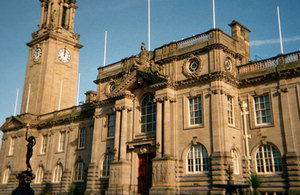Town halls to come clean on taxpayer funded union work
Town halls will have to come clean on how much they spend subsidising staff working on union business.

Town halls will have to come clean on how much they spend subsidising staff working on union business rather than frontline services, after new rules came into force to boost local transparency.
The transparency code means all councils have to publish details on the number of public sector staff who spend some of their working week on union duties and how much that costs the taxpayer.
Local Government Secretary Eric Pickles wants councils to curb the practice of paying staff to work for their union - known as facility time - and use the money saved to protect frontline services and keep Council Tax down.
Mr Pickles said:
Trade union activities should be paid for by union subscriptions, not bankrolled by the taxpayer. Taxpayers have a right to know how much of their money is being spent on subsidising council workers to act as union officials rather than working on frontline services.
Greater power for local government must go hand in hand with greater local transparency and local accountability. Therefore it is only right we give Council Tax payers the data they need to play a bigger role in local democracy.
This government has empowered an army of armchair auditors to hold their council to account, expose waste and ensure town halls are making the sensible savings necessary to keep Council Tax bills down and protect frontline services.
The new code will force councils to publish full details of the total number of staff who are union officials and the numbers who spend at least half their working week on union business. An estimate of the total amount spent on subsidising union work will also be published as part of a new wave of town hall transparency.
The code will also allow taxpayers to scrutinise how councils clamp down on fraud, collect household rubbish and spend parking fine profits.
Ministers have already ended the Audit Commission’s top-down inspection for local government and are replacing it with new local arrangements for auditing councils as well as putting in place rules requiring councillors to register trade union affiliations and dealings.
Government guidance on openness and transparency of a councillor’s personal interests has been revised to include specifically registering union memberships.
Further information
This open data push will ensure information published by councils in the name of local transparency and accountability is made even more accessible. With the new law that has come into force, councils will also be obliged to publish details of contracts and all land and building assets they are sitting on as well as subsidies given to trade unions including so-called ‘facility time’.
This government believes the availability of data not only boosts transparency and accountability but can also support local economic growth by opening up new markets for local businesses, the voluntary and community sectors and social enterprises to run services or manage public assets.
See the transparency code for local government.
What it says on trade unions:
Trade union facility time
Local authorities must publish the following information on trade union facility time:
- total number (absolute number and full time equivalent) of staff who are union representatives (including general, learning and health and safety representatives)
- total number (absolute number and full time equivalent) of union representatives who devote at least 50% of their time to union duties
- names of all trade unions represented in the local authority
- a basic estimate of spending on unions (calculated as the number of full time equivalent days spent on union duties multiplied by the average salary)
- a basic estimate of spending on unions as a percentage of the total pay bill (calculated as the number of full time equivalent days spent on union duties multiplied by the average salary divided by the total pay bill)
Office address and general enquiries
2 Marsham StreetLondon
SW1P 4DF
Contact form https://www.gov.uk/gui...
General enquiries: please use this number if you are a member of the public 030 3444 0000
If your enquiry is related to COVID-19 please check our guidance page first before you contact us - https://www.gov.uk/guidance/coronavirus-covid-19-guidance-for-local-government.
If you still need to contact us please use the contact form above to get in touch, because of coronavirus (COVID-19). If you send it by post it will not receive a reply within normal timescale.
Media enquiries
Email newsdesk@communities.gov.uk
Please use this number if you are a journalist wishing to speak to Press Office 0303 444 1209